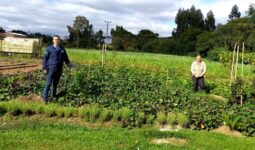
Home Garden Planting seeds for the future | PMI
Having a garden to maintain may feel like a chore, or a pastime. But for some, it’s a lifeline, one that can provide—amongst other benefits—an extra source of income.
Philip Morris Brazil, in partnership with the Brazilian Agricultural Research Corporation from the Ministry of Agriculture, Livestock, and Food Supply (EMBRAPA) has been working to help rural community members who have the space to create and maintain smallholdings to grow a range of plants, fruits, and vegetables, through a project called “Home Garden.”
The main objectives of the project, which has been running since 2017, are to promote both the diversification of land and the production of healthy food for families, and to mitigate the incidence of child labor.
Home Garden helps families create and maintain gardens on their own land so that they can grow sustenance crops, and potentially sell the surplus (such as juices from fruits), creating a viable revenue source. This added revenue stream can help boost household income and could create better opportunities for the future.

The Home Garden project has garnered significant support from our farmers, and throughout rural communities in the southern states of Brazil.
Who does Home Garden help?
The breakdown of participants in the scheme is split evenly between farmers contracted to Philip Morris Brazil and family farmers who have no link to our supply chain in various rural communities across southern Brazil.
Whilst the main objective is to support families and minimize the prevalence of child labor, an additional impact is making these areas more biodiverse by reintroducing indigenous plants specific to certain Brazilian regions. As many of the farms are in quite remote areas, the initiative can also help introduce a wider range of fruits and vegetables that may not have been easily available.
How does it work?
The project is 100 percent financed by Philip Morris Brazil, and the coordination of activities are managed by EMBRAPA, which favors the principles of ecologically based production, ensuring that they are mindful of cultural, ethnic,
environmental, food, economic, and medicinal issues.
Applicants either need an existing farm, or the space to develop a garden. They receive a home visit to see if the space and farmers have the potential to develop and maintain a home garden for the next three years. They also get an introduction to explain
the scheme and are provided with training.
Philip Morris Brazil covers implementation costs to minimize any obstacles. After the implementation year, the Home Garden teams monitor the gardens for the next two years to offer assistance and support.
The Home Garden playbook includes a 28-step program to help deliver success. The teams use a viability index to grade the gardens, inform further monitoring, and plan the families’ training needs for the following year.
How much has been achieved?
To date, 500 gardens have been created across three states in southern Brazil. As each region has differing climates and soil, the scheme offers training specific to the area. In addition to this, two agricultural schools have also received support from Philip Morris Brazil’s and the initiative’s experts, teaching students and families succession planning and entrepreneurial skills, as well as how to improve farming management.
Philip Morris Brazil has stressed the importance of working with a partner such as EMBRAPA that has the technology and expertise to support such a monumental goal. Because of the soil and climate variables, having the correct practices in place to ensure the success of the indigenous species planted in these areas was crucial. Time was also another important investment in the success of this project—ensuring that all the families in the scheme had enough support to harness the technologies on offer to make the gardens a success.
What about the future?
Following an investment of around USD 500,000 over the last six years, the focus of the initiative is now on maintaining these gardens.
So far this year, there has been a further investment of around USD 100,000 to manage the existing Home Gardens, 160 of which have been created in the last two years, which includes 15 new gardens implemented by students from the two supported agricultural schools at their family properties.
This initiative works toward maintaining Philip Morris International’s aspiration of zero incidence of child labor in its tobacco supply chain.
“The Home Garden project has garnered significant support from our farmers and has made a positive impact on the rural communities in the southern states of Brazil,” says Dayana Kumm, Sustainability Manager at Philip Morris Brazil. “We’ve witnessed the production of nutritious food for these rural families, leading to increased diversification in their properties. This project not only unites families, but also helps bridge the gap between the younger generation and the rural way of life.”




